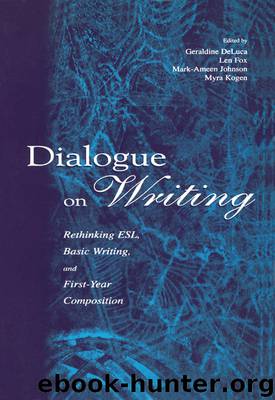Dialogue on Writing by DeLuca Geraldine

Author:DeLuca, Geraldine.
Language: eng
Format: epub
Publisher: Taylor & Francis Ltd
Thus, the work of Lyotard, Haraway, Harding, and many other theorists suggests that it is incumbent upon us all—especially, it would seem, those of us in rhetoric and composition—to challenge received notions of writing, of composition itself, to move away from a discourse of mastery and assertion toward a more dialogic, dynamic, open-ended, receptive, nonassertive stance. Of course, none of these theorists has “proven” anything about writing, none has provided an unassailable truth, and none has posited a “theory” of writing in the strict sense of a generalizable, universally applicable explanation; what they have done, however, is to speculate productively about how writing is deeply implicated in structures of power and domination, how writing can never be disconnected from ideology, how writing as traditionally conceived is driven by a discourse of mastery and a rhetoric of assertion.
Critiques of the discourse of mastery, the rhetoric of assertion, arise from numerous sites, not just the few mentioned here. The theorists who propose them often have divergent, even opposing agendas and would not agree with one another on a multitude of points; however, the fact that they all in one way or another are theorizing about writing in similar ways and are proposing a rethinking or reinventing of writing suggests that collectively they may have something significant to contribute to our own understandings, our own speculations. Such theorizing can have a profound effect on composition as a field, especially as we continue to grapple with questions of disciplinary identity. And, of course, if such speculations truly make sense, if they help us conceive of writing in new and potentially more useful and productive ways, then it is also incumbent upon us to adjust our pedagogies accordingly so as not to reinscribe naive or less useful conceptions of what it means to “compose.” Thus, such work can potentially have significant implications not only for our own scholarly understandings of the workings of discourse but also for how we enact those understandings in the post-process classroom. And, undoubtedly, such theorizing is likely to be much more useful than process-oriented efforts to “master” the writing process, to define it, to systematize it.
Note
An earlier version of this chapter with a very different focus appeared as “Theory and the Rhetoric of Assertion,” Composition Forum 6 (1995): 53–61.
References
Covino, William A. Forms of Wondering: A Dialogue on Writing, for Writers. Portsmouth, NH: Boynton/Cook, 1990.
Haraway, Donna. Simians, Cyborgs, and Women: The Reinvention of Nature. New York: Routledge, 1991.
Haraway, Donna. “Writing, Literacy and Technology: Toward a Cyborg Writing.” Interview with Gary Olson. Women Writing Culture. Ed. Gary A. Olson and Elizabeth Hirsh. Albany: State U of New York P, 1995, 45–77.
Harding, Sandra. “Starting from Marginalized Lives: A Conversation with Sandra Harding.” Interview with Elizabeth Hirsh and Gary A. Olson. Journal of Advanced Composition 15 (1995): 193–225.
Lyotard, Jean-Francois. Peregrinations: Law, Form, Event. New York: Columbia UP, 1988.
Lyotard, Jean-Francois. “Resisting a Discourse of Mastery: A Conversation with Jean-Francois Lyotard.” Interview with Gary A. Olson. Women Writing Culture. Ed. Gary A. Olson and Elizabeth Hirsh. Albany: State U of New York P, 1995, 169–192.
Download
This site does not store any files on its server. We only index and link to content provided by other sites. Please contact the content providers to delete copyright contents if any and email us, we'll remove relevant links or contents immediately.
Asking the Right Questions: A Guide to Critical Thinking by M. Neil Browne & Stuart M. Keeley(5772)
Autoboyography by Christina Lauren(5234)
Eat That Frog! by Brian Tracy(4535)
Dialogue by Robert McKee(4400)
Sticky Fingers by Joe Hagan(4197)
Journeys Out of the Body by Robert Monroe(3624)
Annapurna by Maurice Herzog(3467)
Full Circle by Michael Palin(3448)
Schaum's Quick Guide to Writing Great Short Stories by Margaret Lucke(3378)
Elements of Style 2017 by Richard De A'Morelli(3349)
The Art of Dramatic Writing: Its Basis in the Creative Interpretation of Human Motives by Egri Lajos(3067)
Atlas Obscura by Joshua Foer(2961)
Why I Write by George Orwell(2951)
The Fight by Norman Mailer(2939)
The Diviners by Libba Bray(2936)
In Patagonia by Bruce Chatwin(2927)
The Mental Game of Writing: How to Overcome Obstacles, Stay Creative and Productive, and Free Your Mind for Success by James Scott Bell(2908)
Venice by Jan Morris(2573)
The Elements of Style by William Strunk and E. B. White(2473)
